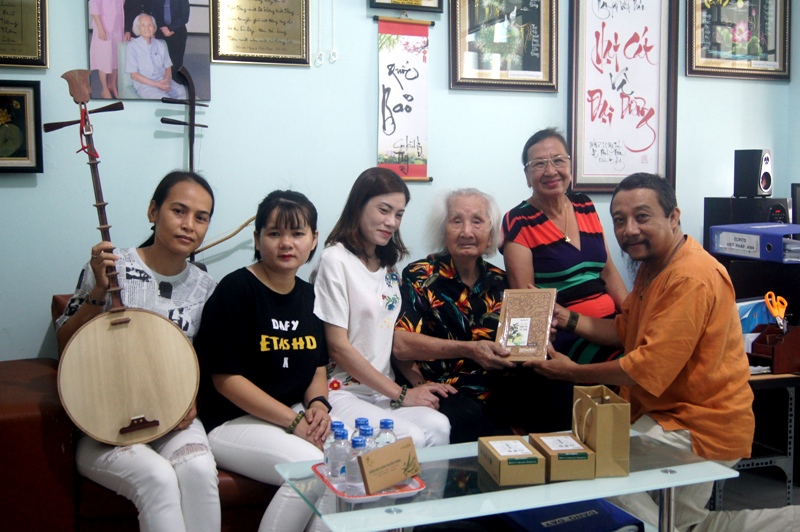Với truyền thống tôn sư trọng đạo của người Việt Nam nhân tháng 11 – Kỷ niệm ngày nhà giáo Việt Nam. Xin được chia sẻ câu chuyện gặp gỡ của nhà Song Hỷ Trà với nhạc sư Vĩnh Bảo vào tháng 8 năm 2020 khi cụ 103 tuổi.
1. Gặp gỡ
Người bạn đồng hành cùng nhà Song Hỷ Trà đã lâu – nghệ sỹ đàn tranh Hải Phượng đã nhiều lần giới thiệu về nhạc sư Vĩnh Bảo với chúng tôi. Ngưỡng mộ tài đức của nhạc sư nhưng chưa có chuyến nào được đi cùng Hải Phượng về thăm cụ – nhạc sư Vĩnh Bảo tại Cao Lãnh, Đồng Tháp. Mới đây nhân một chuyến về Sài Gòn, chị Thu Anh trưởng nữ của Cụ đến chơi với nhà Song Hỷ Trà, thế là nên duyên chúng tôi đã về thăm cụ – nhạc sư Vĩnh Bảo tại quê nhà của cụ

2. Về nhạc sư Vĩnh Bảo
NGUYỄN – VĨNH – BẢO’s BIOGRAPHY
Nguyễn Vĩnh Bảo was born in August 19, 1918 in Mỹ trà village, Cao Lãnh District, Sadec province (now Đồng Tháp), the second youngest of seven children 4 boys and 3 girls – from the landholding parents.
This 101 years old is reckoned to be one of the greatest gurdian of a form of Vietnamese music called Đờn Ca Tài Tử Nam Bộ – or the Music of the Amateurs Tradition of the South.
His father Nguyen – Ham – Ninh (1887-1950) was a culured person, fond of classical theatre (Hát Bội), music and poetry lover, played pretty well three musical instruments such as the moon-shaped lute (đàn Kìm), the sixteen-stringed Zither (đờn Tranh, the two-stringed fiddle (đờn Có).
At 5 years old, Nguyễn Vĩnh Bảo began his self-study on the đờn Đoản (short-necked moon-shaped lute)by listening to his brothers practice.
Soon after, he started studying the Western Mandolin, the moon-shaped lute (đờn Kìm) and the two-stringed fiddle (đờn Cò, đờn Gáo), the sixteen-stringed Zither (đờn Tranh).
All his brothers and sisters played traditional music for their enjoyment, but Nguyễn Vĩnh Bảo was the only one to devote his life to carrying on the tradition.
From 1925, he has relationship with more than 200 musicians. Some outstanding teachers providing him musical training at the very high level. Nguyễn Vĩnh Bảo ultimately mastered all misical instruments of the Amateur music tradition (Đờn Ca Tài Tử), and familiarize with the piano classic music Nguyễn Vĩnh Bảo’s mother Nguyễn Thị Cận (1885-1970) was a woman of rare quality who is remembered by Nguyễn Vĩnh Bảo with special reverece and affection. For without her support and encouragement, he could not devote his life to music. At 13 years, Nguyên Vĩnh Bảo left Cao Lãnh primarily school and began his self-study of French and English.
In 1938, (20 years old), a German producer for Beka Records, invited him to participate in a professional recording session.
In 1956, the National School of Music in Saigon was set up with the attemps to support Western and Vietnamese traditional music. Nguyễn Vĩnh Bảo was an instructor of the Vietnamese Zither (đờn Tranh) and has strongly made a major contribution to the academic program – tablature notation system for the Zither (đờn Tranh), the moon – shaped lute (đờn Kim) and the Monochord (đờn Bầu).
In 1960, his began the innovation of the 16-stringed popular Zither (đàn Tranh 16 dây) to 17,19 and 21- stringed Zithers. This innovation expanded not only the pitch content available to musicians but the palate of timbres musicians can use to express the sentiments associated with the rich modes of Southern Vietnamese traditional music.
In 1963, he was one of the Distinguish Delegate in the Southeast Asia Cultural Festival in Singapore.
From 1964 (after leaving the School of Music) to 1974, he was invited to give a number of lectures, recital-concerts on Vietnamese traditional music.
In 1965 at the Vietnamese American Associantion, 55-bis Mạc Đỉnh Chi St.
1970 at the National Conservatory of Music and Drama, 112 Nguyễn Du St.
1971 at Goeth Intitute Center, 120 Phan Đình Phùng St
1974 at Frech Culutural Center, 31 Đùn Đất St.
From October 1,1971 to March 31,1972, he was visiting Professor of Music at Southern Illinois University (Center for Vietnamese Studies in Carbondale) where he tutored fifteen students on the Vietnamese Zither and served as a resource and consultant to the Project Director.
With Dr. Trần Văn Khê from Paris and Phạm Duy a well know modern music composer from Saigon, he played a leading role in a very successful symposium on Vietnamese music and performed in concert before a public audience at this University.
In April 1972, at Paris, he was invited to give a joint-lecture performance with Dr.Trần Văn Khê at the Grand Amphithéâtre de I’Institut d’Art et d’Archéologie in Paris. He also made a series of recording with Doctor Trần Văn Khê for Ocora Records and UNESCO.
In 1972, after returning to Saigon, he continued to give private music lessons at home, online and to built musical instruments.
For students living in Saigon, his studio is available three times a week for music lessons. For students living abroad, he sends them sheet-music scores and recording via email. They read written scores, listen to the recordings and pratice. They then record themselves playing and send them to him for comment, or teach them online via skype.
Theo lời ghi của nhạc sư Vĩnh Bảo
Tại thành phố Cao Lãnh, chúng tôi được chị Thu Anh làm hướng dẫn viên đi thăm nhà trưng bày: Nguyễn Vĩnh Bảo – Giai điệu và cuộc đời – Xem thêm
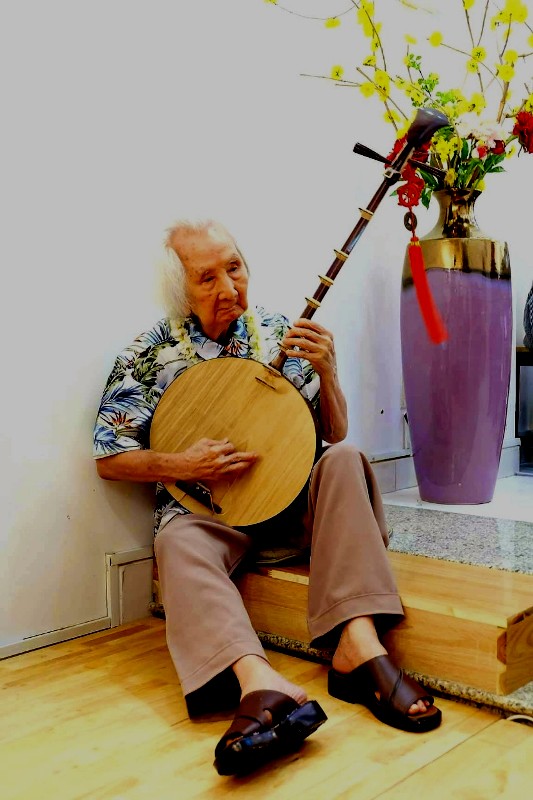
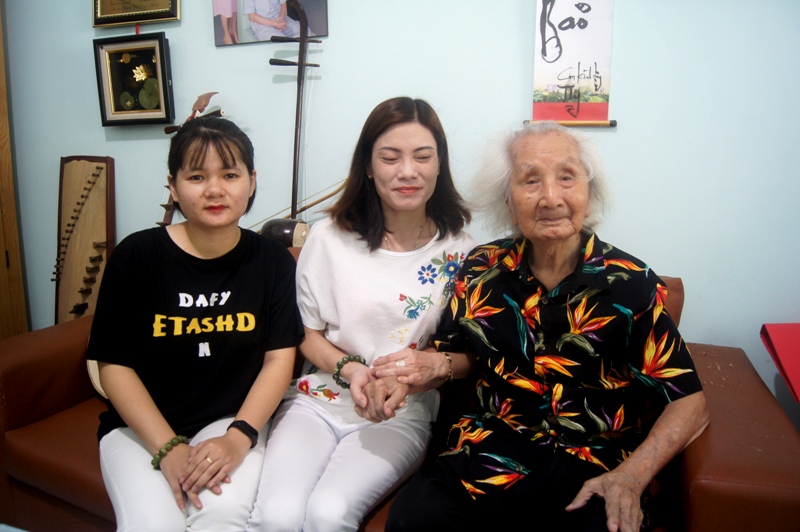
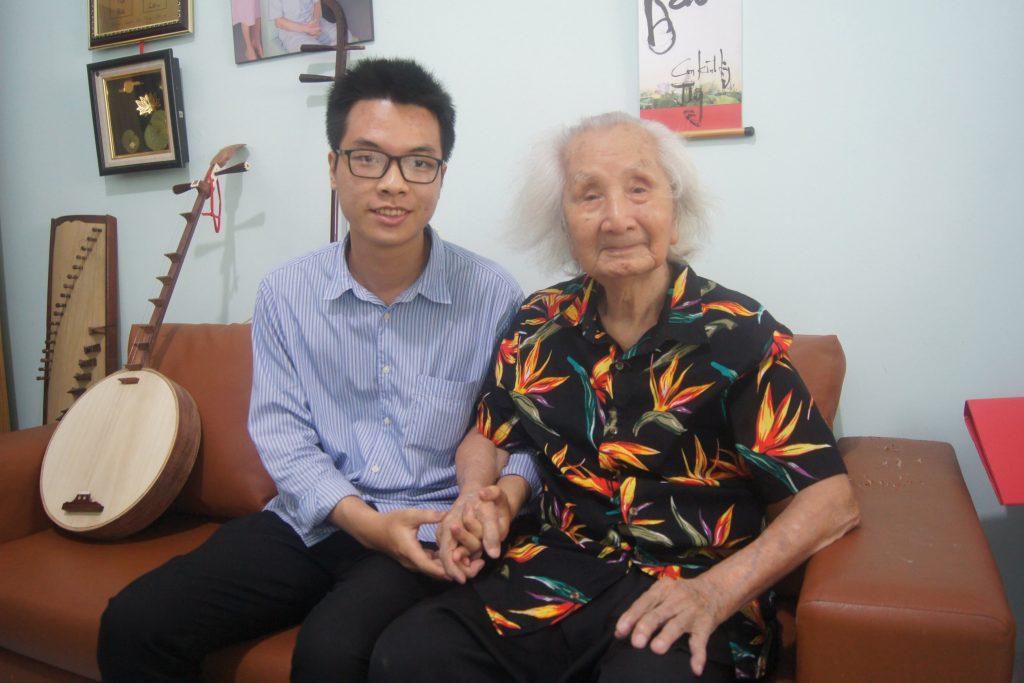
3. Những món quà của nhạc sư Vĩnh Bảo tặng nhà Song Hỷ Trà
Thật cảm động, chúng tôi nhận được món quà trân quí của cụ – cây đàn kìm hay còn gọi là đàn nguyệt do cụ làm và chỉnh âm với dòng lưu bút cùng chữ ký đẹp, phóng đãng. Thêm đó còn cuốn sách về cuộc đời của cụ và nhiều đồ lưu niện khác.
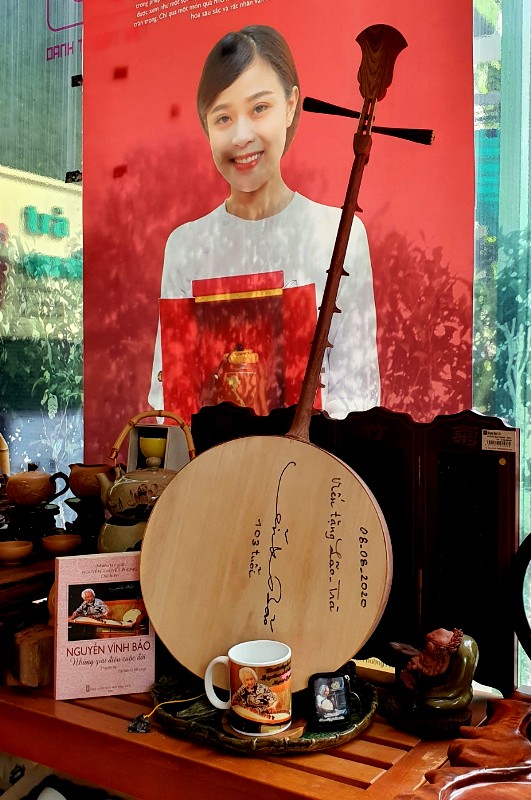
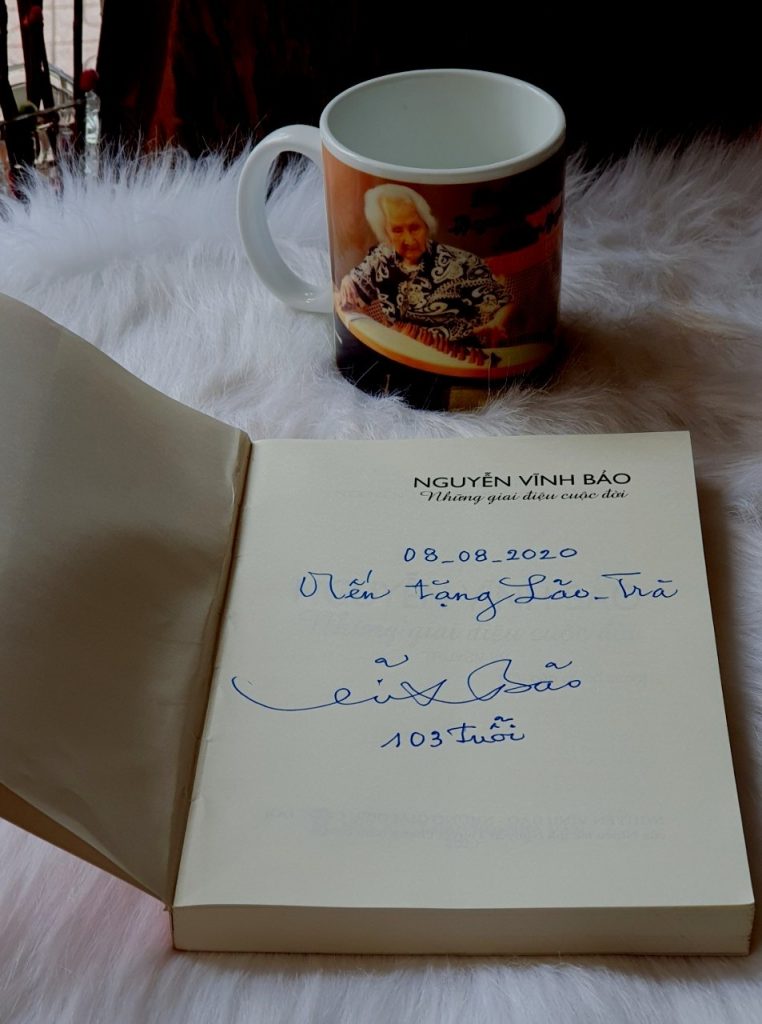
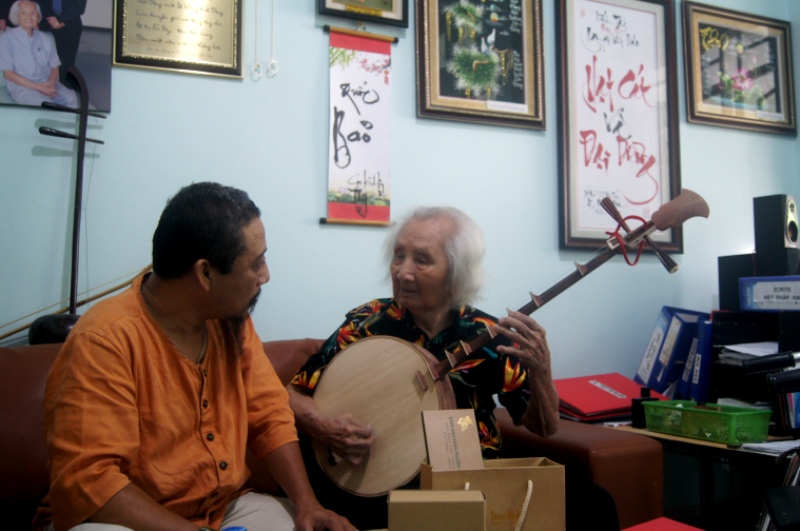
Những bức hình sẽ lưu giữ kỷ niệm đẹp này mãi và không quên lời cụ dặn: Sống không để ai buồn.
